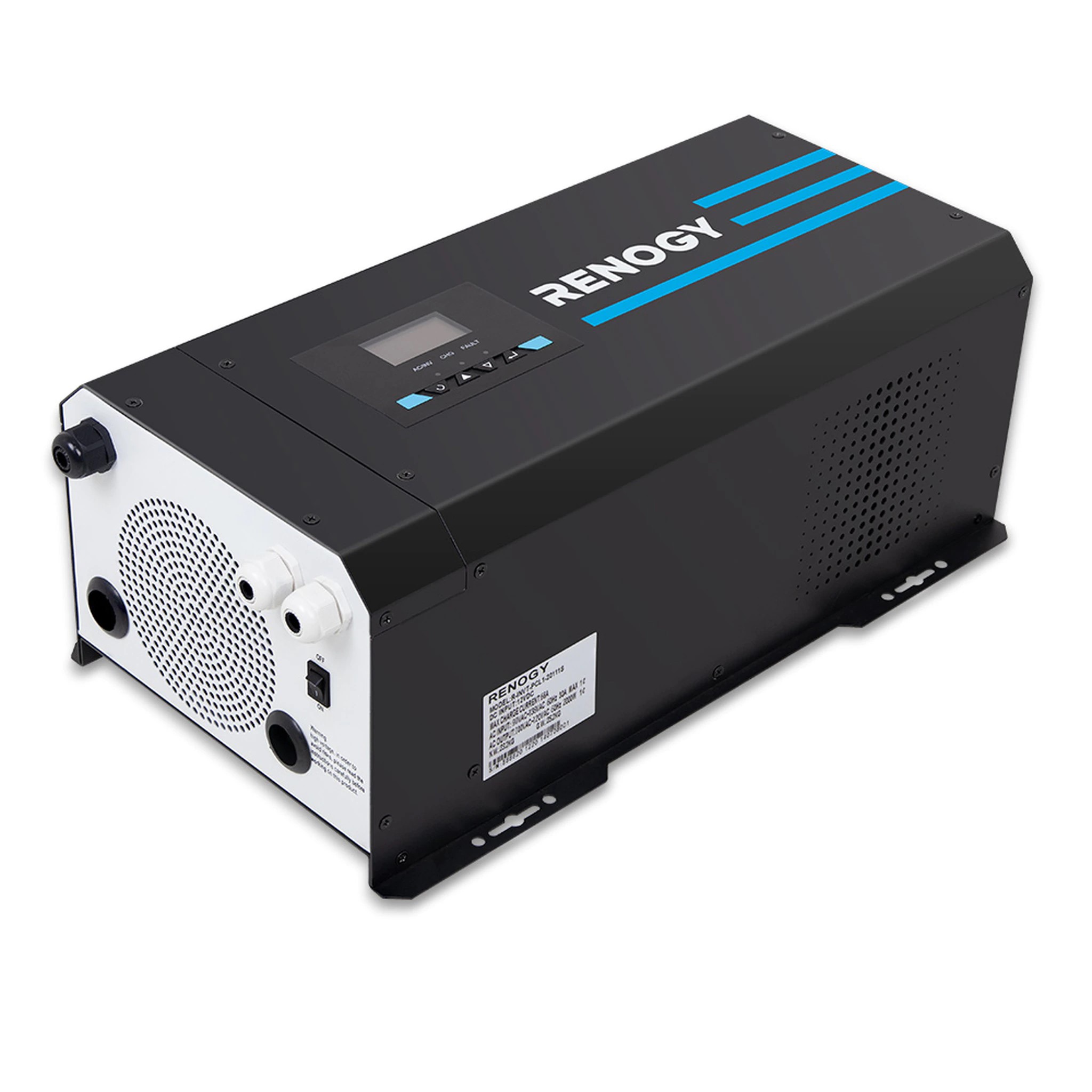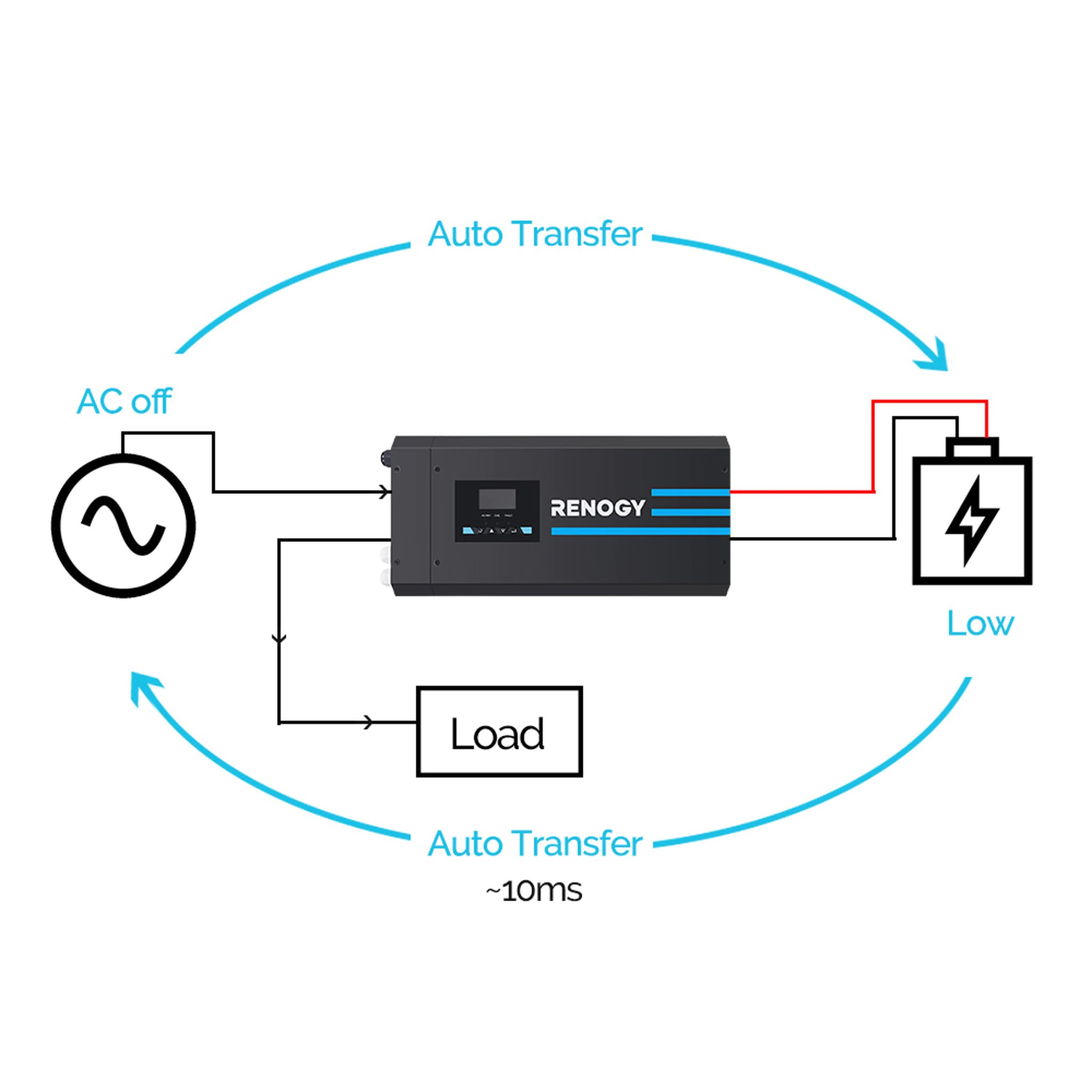What is a solar inverter charger?
Deciding on an inverter charger for your solar installation
You may know by now that inverters perform a key function of turning DC output from your solar panels into AC energy your appliances can use. They are an important part of every solar installation. If you have solar panels installed on your RV, van, or motorhome, there is a more advanced version of the standard inverter that may be worth your money: solar inverter chargers. Because solar inverter chargers can turn DC to AC, as well as charge a battery bank when shore power is available, more and more RV, van, and tiny home dwellers are adding solar inverter chargers to their installations. Who should purchase solar inverter chargers? Are they worth the investment?
What are inverters and why do I need them?
As mentioned above, solar inverters turn the DC output collected from your solar panels into alternating current (AC), which is the standard used by all commercial appliances and devices. There are a couple different inverter types, including pure sine wave and modified sine wave inverters. Keep in mind standalone inverters need a battery bank to function.
What’s the difference between pure sine wave and modified sine wave inverters?
Pure Sine Wave Inverters: As the name suggests, pure sine wave inverters produce current in a pure sine wave shape. Because of this, pure sine wave inverters provide smooth, quiet, and reliable electricity to operate appliances and electronics without any interference. Pure sine wave inverters also provide overload protection for both DC input and AC output to prevent damage to the components and the unit.
Modified Sine Wave Inverters: In modified sine wave inverters, the polarity abruptly switches from positive to negative. When looking at the wave, it has a stair-step, square pattern, where the polarity is flipped back and forth. This is in contrast to pure sine wave inverters which produce a true sine wave. It’s important to keep in mind that modified sine wave inverters can negatively affect delicate, sensitive equipment and can also produce an audible hum while operating. So if you have medical equipment you need to power, such as a CPAP machine, you won’t be able to use a modified sine wave inverter. However, with simple devices and appliances, modified sine wave inverters can be a great fit for a solar installation.

An inverter charger can charge a battery bank using shore power when that’s available, as well as do everything a regular solar inverter can do. An inverter charger has an automatic sensor transfer switch that will switch to input when an outside power is connected. When that shore power is disconnected, your solar installation will resume back to its normal operational state.
As you can imagine, the main advantage of a solar inverter charger is they deliver continuous energy, regardless of what charging conditions are. This means you’ll never be left in the dark, even if your panels aren’t collecting enough energy.
What type of batteries can I charge with a solar inverter charger?
The inverter charger can charge a range of battery types, including sealed, gel, and flooded lead acid batteries. If you have a lithium iron phosphate battery, a solar inverter charger will not be compatible.

What is a transfer switch?
A transfer switch allows your solar inverter charger to automatically switch between the AC shore power and AC inverter mode (DC to AC), allowing electronics to continue working without any interruptions.
Who should purchase a solar inverter charger?
Solar inverter chargers ensure you’ll always have access to energy, which is especially handy when you’re in areas where you may not be getting enough sunlight to charge your battery bank with your solar panels.
• I live off-grid, but have access to shore power, including campground hookups or a generator.
• I need supplemental energy or live in cloudy areas or an area without lots of sunlight.
• I am looking for a backup power solution.
What size solar inverter charger do I need?
Inverter chargers are great for RV’s, boats, and other off-grid applications because the inverter charger can charge the battery bank from shore power, and the inverter will then convert the DC power to run AC loads in the space. Renogy offers a few different sized solar inverter chargers, including the Renogy 3000W pure sine wave inverter charger and if you have smaller needs, the 2000w or 1000w inverter charger.
To select the right size inverter charger for your system, you should keep in mind that your inverter charger should match the voltage of the battery. If you have a 12V battery, you should get a 12V inverter charger. You also want to make sure your inverter charger can handle at least 1.5 times the demand you regularly expect. To ensure this, we recommend adding up the rated watts of the loads that you intend to run at the same time. If you expect to use a laptop, an LED light, and water pump at the same time and find those loads add up to a total wattage consumption of 600-watts per hour, we recommend at least a 1,000-watt inverter charger.
How do I size my solar installation?
It’s important your system overall is properly sized to ensure you have the right inverter charger to meet your needs. Need help deciding how much solar power you’ll need to meet your energy needs? Use the Renogy solar power calculator to determine your needs.
Conclusion
Solar inverter chargers can be a game changer for many RV, van, or tiny home dwellers. Gone are the days of worrying about having reliable, continuous access to energy. Solar inverter chargers are versatile, reliable, and give you the peace of mind that no matter the conditions or season, your solar installation will be able to meet your energy needs.
See other related articles at Renogy:
Solar Panels Maintenance Best Practices And Costs
A Guide to Installing Solar Panels On Van Or RV
Solar Panels 101: A Beginner's Guide
The Ultimate Guide To DIY Off-Grid Solar Systems
Do solar panels increase home value
How efficient are solar panels
How Many Solar Panels Do I Need








